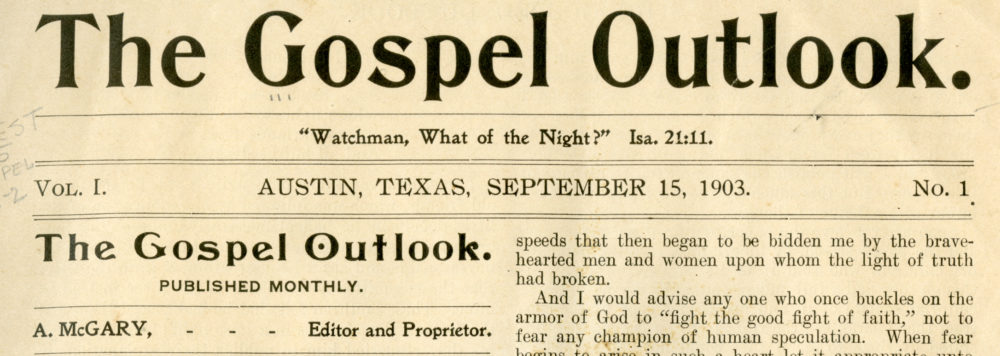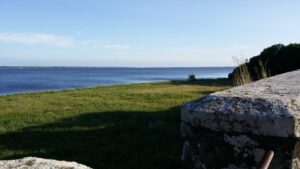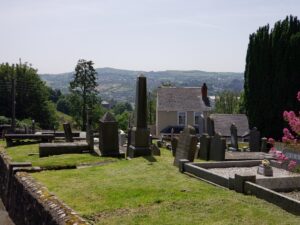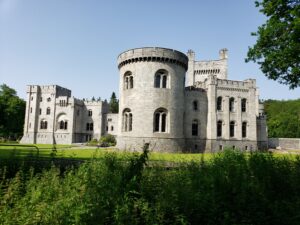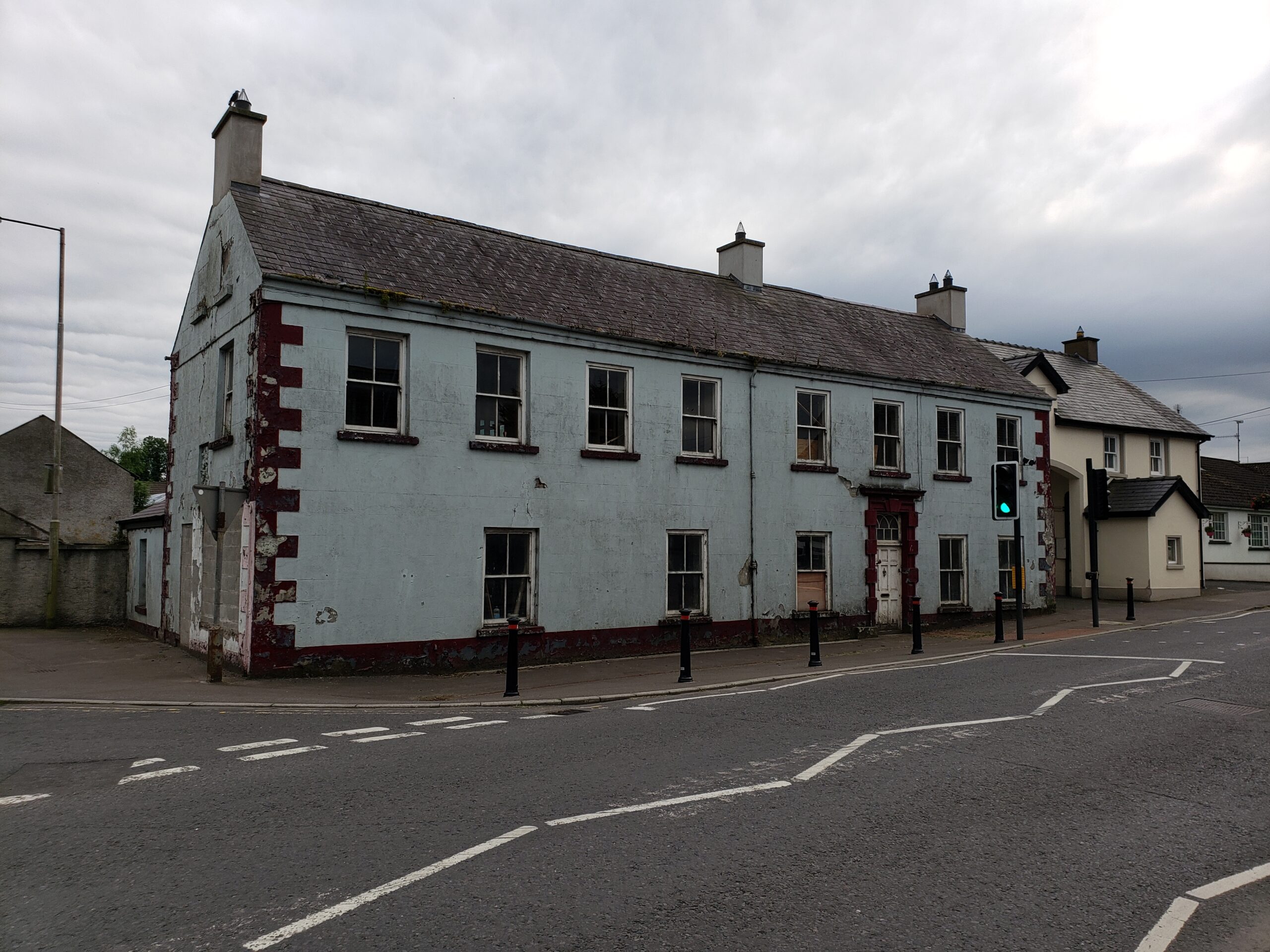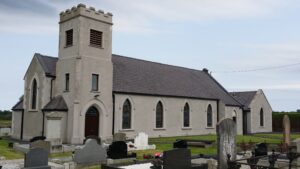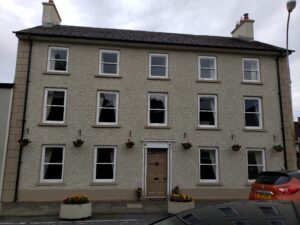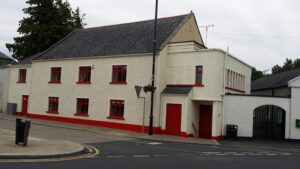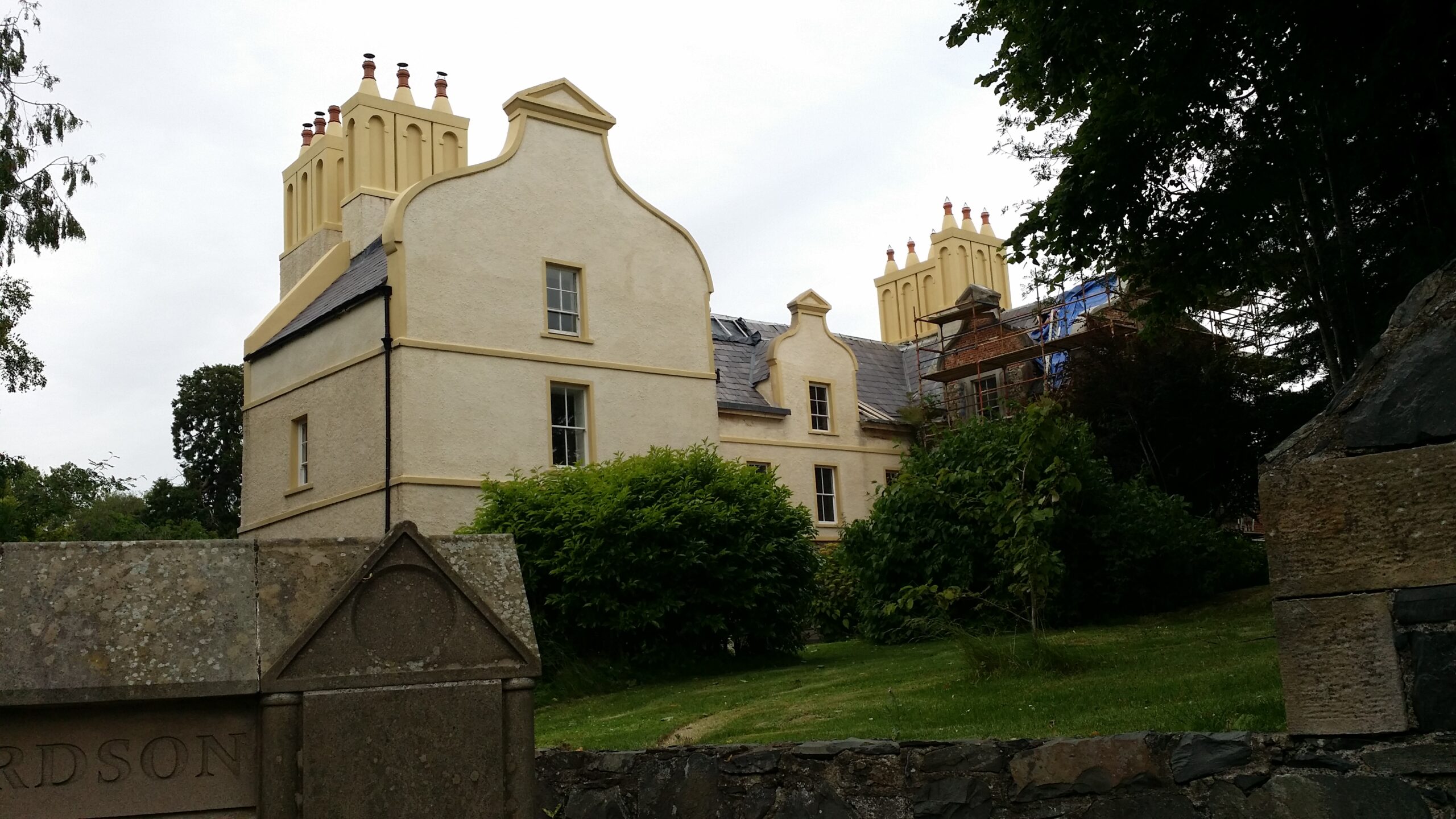By Carisse Mickey Berryhill, PhD
Series introduction: Alexander Campbell (1788-1866) was born and grew up in Northern Ireland. In 1807, his father Thomas Campbell (1763-1854), a Presbyterian minister, emigrated from Northern Ireland to western Pennsylvania and sent for the rest of the family to join him in 1808. Shipwrecked on the western coast of Scotland, the family spent almost a year in Glasgow before joining Thomas in 1809. During that time Alexander studied at the University of Glasgow. In 2019 I set out to visit the places in Ireland and Scotland that are the backdrop for this crucial year in his life. Travel with me as we retrace his journey in three posts: the Homeland, the Interruption, and the University of Glasgow.
Alexander, his mother Jane Corneigle Campbell, and six younger siblings sailed from Londonderry for Philadelphia aboard the Hibernia on October 1, 1808. The younger children were Dorothea, 15; Nancy, 13; Jane, 8; Thomas, 6; Archibald, 4; and Alicia, 2. Jane was 45. Alexander was 20. There were 70 passengers and 12 crew on the ship. From Londonderry the ship sailed northeast a little more than twenty miles through Lough Foyle, a wide body of water that opens into the Atlantic Ocean.
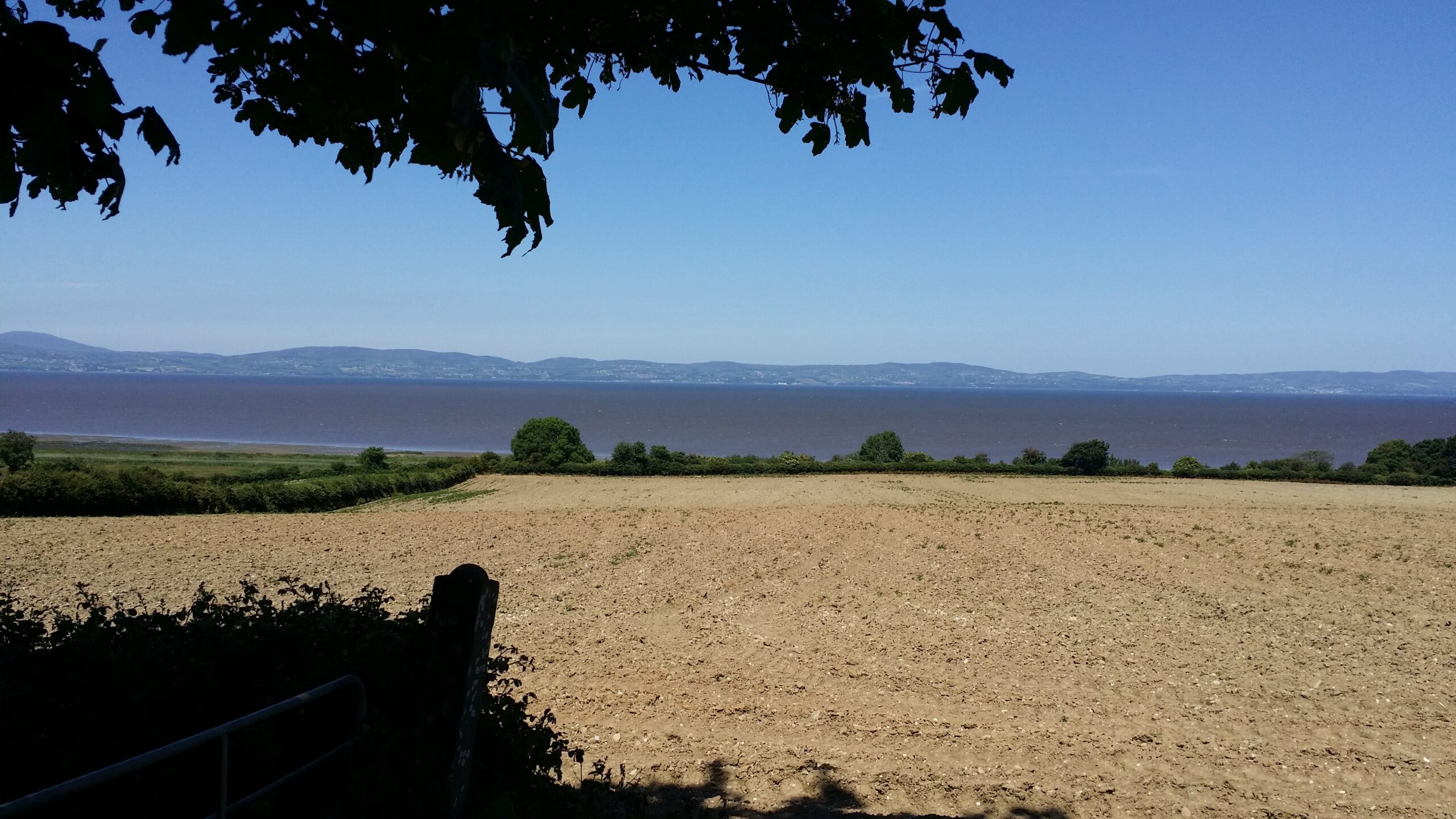
Lough Foyle was the channel running northeast from the port of Londonderry to the Atlantic Ocean. This view from Northern Ireland looks northwest across Lough Foyle to County Donegal, in the Republic of Ireland. Londonderry lies to the left, and the Atlantic Ocean to the right.
On Sunday, October 2, The Hibernia passed out into the ocean at McGilligan’s point and paused to anchor off the Inishowen Point.
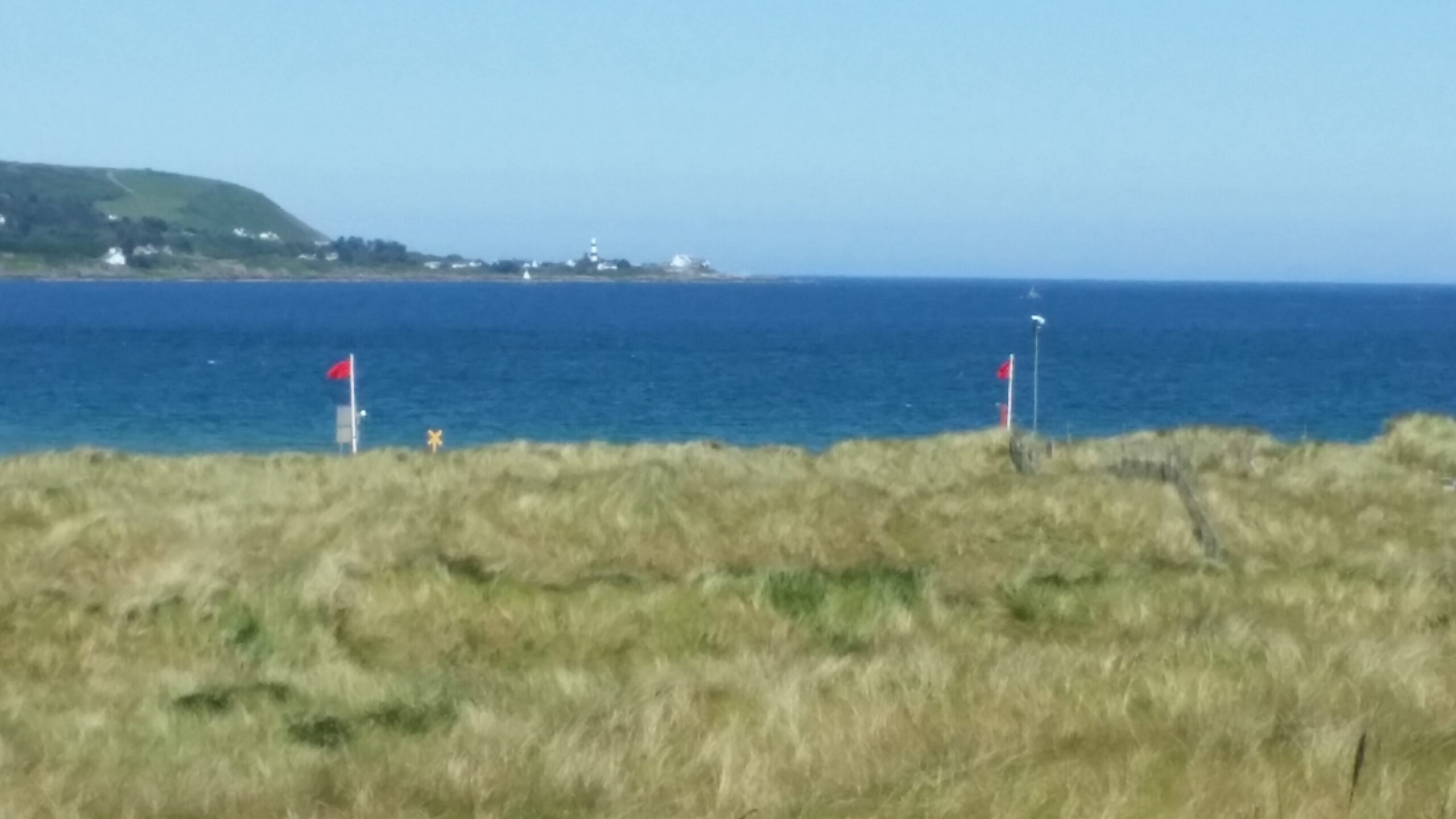
View to the northwest from McGilligan’s Point, Northern Ireland, across Lough Foyle where it opens into the Atlantic ocean. In the distance is the Inishowen Head Lighthouse on the point of County Donegal, Ireland.
On Monday, October 3, the ship sailed west as far as Malin Head, the northwest tip of Ireland. On a clear day, it is easy to see the southwestern islands of Scotland from the coast of Northern Ireland. But toward evening strong winds rose and drove the ship northeast toward the western islands of Scotland about thirty-five miles away.
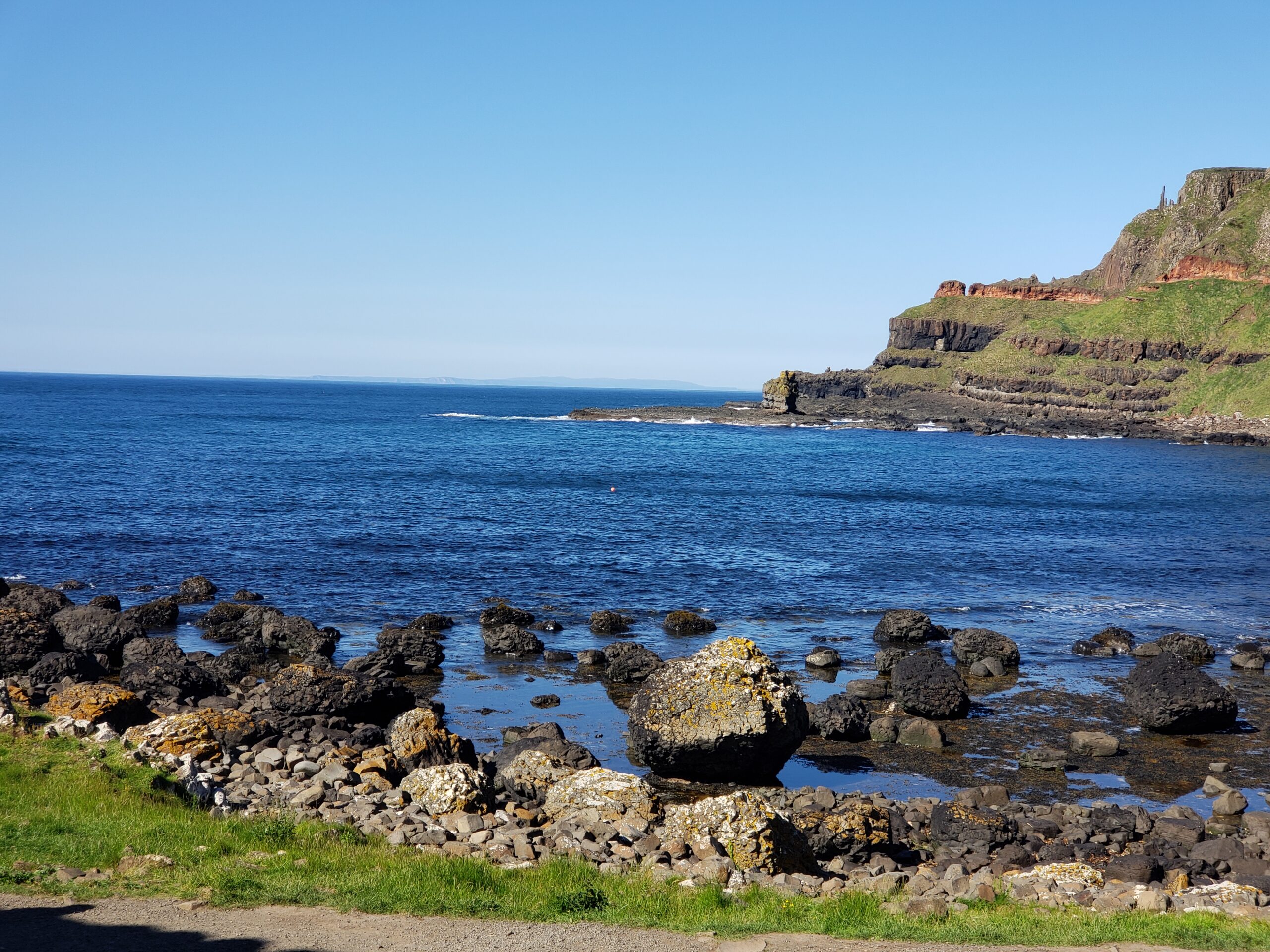
The Isle of Islay thirty miles away on the north horizon, across the North Channel, seen from the north coast of County Antrim, Northern Ireland, at the Giant’s Causeway and Causeway Coast World Heritage Site.
The western coast of Scotland consists of islands. The southernmost group, the Inner Hebrides, includes Islay at the south tip of the group and Jura just north of it. Islay is crescent-shaped, almost divided in half by Loch Indaal Bay. The rocky coasts of the islands are treacherous.

Westernmost of the Inner Hebrides of Scotland, the mountainous Isles of Islay (left) and Jura (right), lie only about thirty miles north of Northern Ireland. View from a ferry east of the two islands, looking west.
The ship Hibernia ran before the wind all night and near daylight made its way into Loch Indall Bay. That morning, October 4, two local pilots came aboard to warn the captain to move the ship a couple of miles northeast to a safer spot near Bowmore harbor.
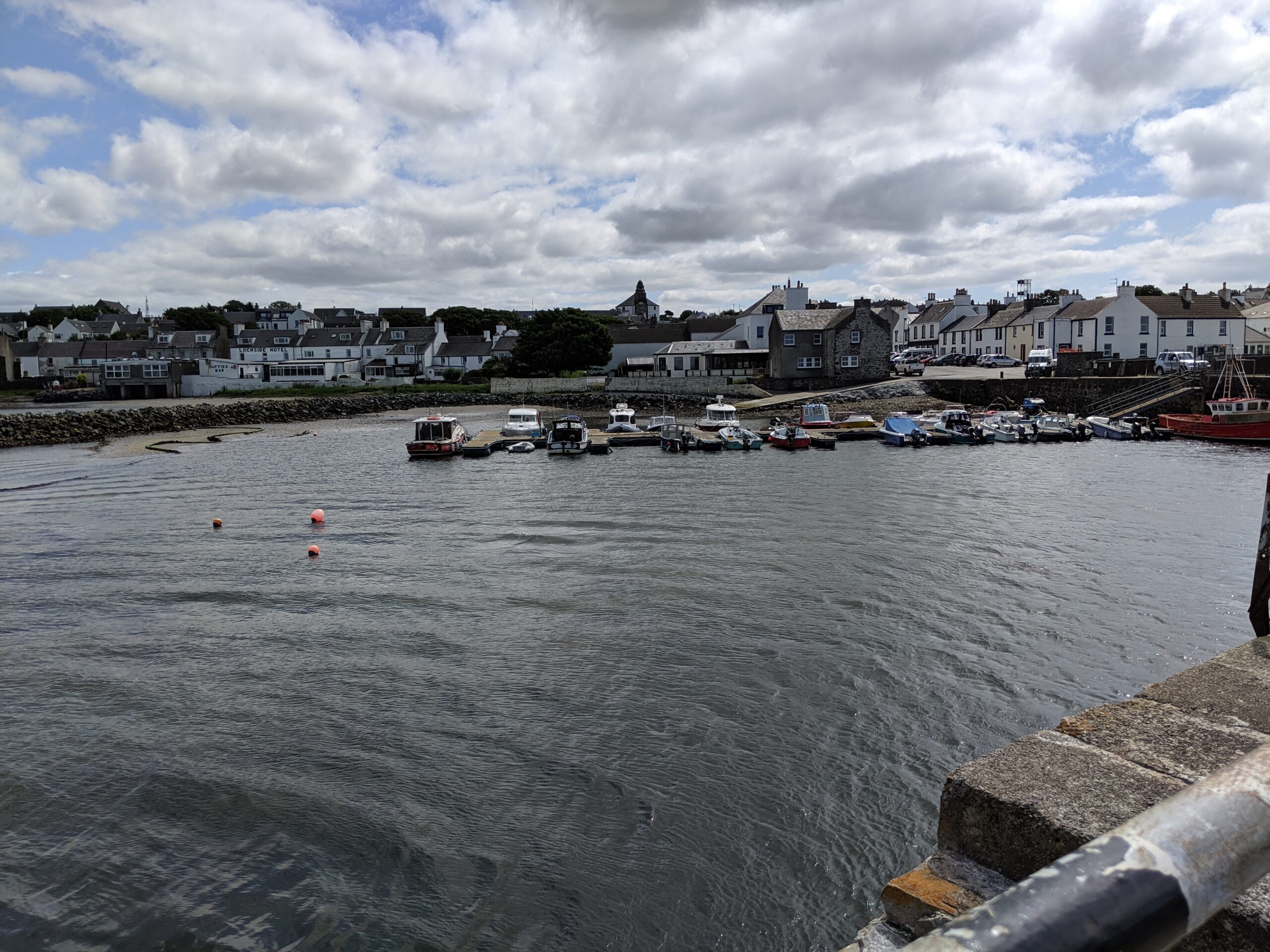
The harbor at the village of Bowmore, with the round Kilarrow Parish Church rising above the town. Looking northeast from the pier.
However, the captain opted to stay anchored near rocky Gartbreck point, waiting for favorable winds to continue the voyage. Three more days passed.
On the evening of Friday, October 7, after family worship, Alexander dozed off while reading and dreamed that the ship had struck a rock. He woke with a sense of premonition and warned his family to be prepared for an emergency. He decided not to undress and kept his shoes near his bed. Everyone went to bed. At about ten pm, a gale suddenly struck the anchored ship and pushed it onto the rocks. Water began rushing in the bottom of the ship and the wind threatened to capsize it. The passengers left the flooded bottom of the ship and crowded in terror on the sloping deck. The crew and passengers hacked down the masts to right the ship. It settled on the rock. Sheets of rain and towering waves broke over the terrified travelers. All they could do was pray and wait for daylight. In this crisis, Alexander saw the futility of ambition and remembered the nobility of his father’s ministry. He decided that if he survived, he would devote his life to ministry.
In the morning of October 8, rescuers could not reach the ship from the shore because of the incoming wind and waves, until they signaled to the sailors to tie a rope to an empty cask and let it float to shore. Then the Islay folk attached a rescue boat to be pulled to the ship. Beginning with the women and children, the passengers were shuttled to the shore. Alexander decided to wait for the last boat. So Jane gathered her younger children on a large rock. They huddled there to wait for him. When he waded ashore about 2 pm, he found them there, wet and numb but all safe. No one on the ship was lost.
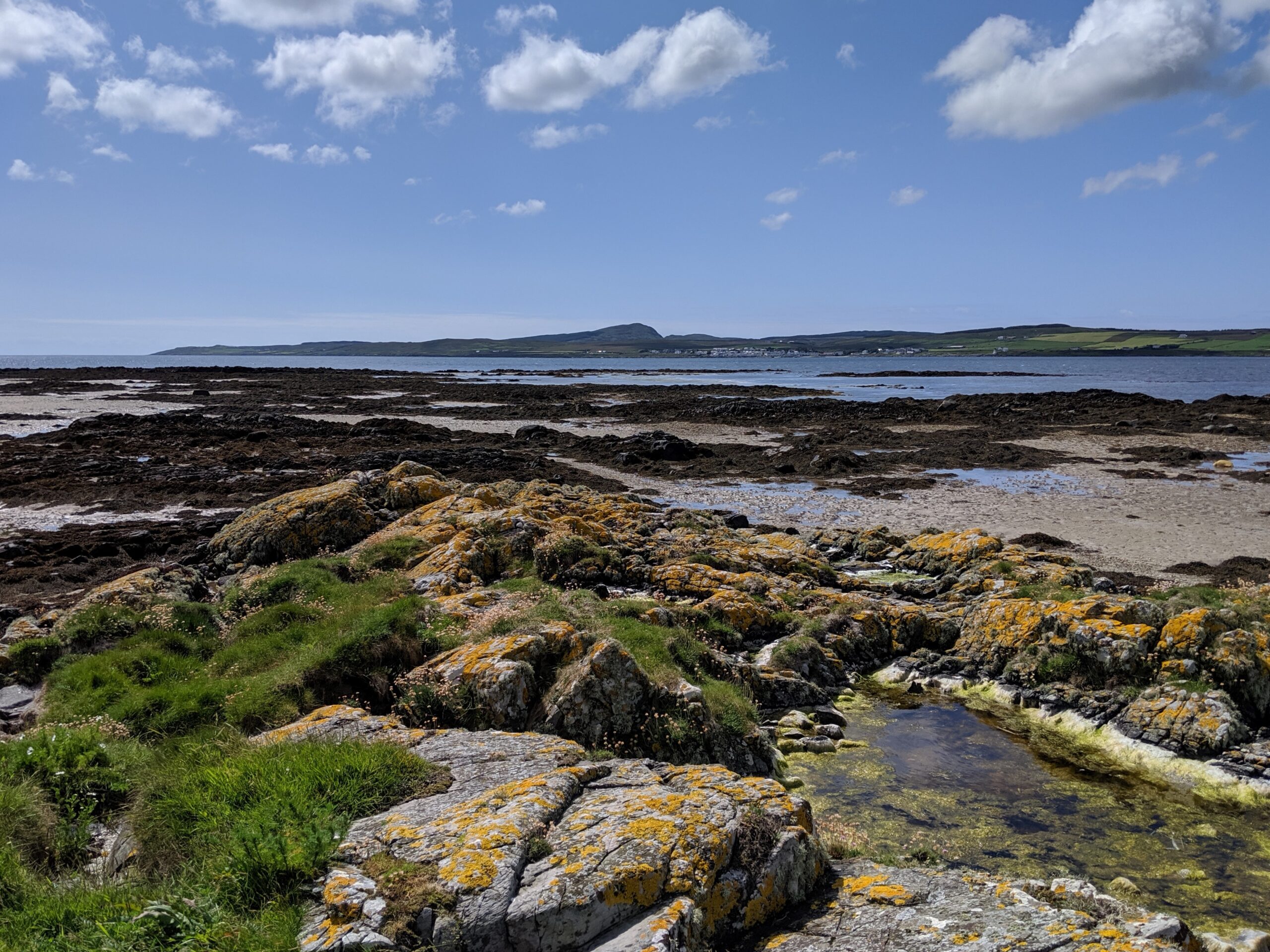
On a rock ridge like this on the southeast side of Loch Indaal Bay, Jane Corneigle Campbell gathered her children in the tempest that had wrecked their ship on the rocky coast here.
The islanders fed and warmed them. A widow who was also descended from the Campbells of Argyllshire welcomed them into her nearby home until they were warm and dry. Then they went on to the village of Bowmore and found lodging with a family there. Bowmore was a new town. It had been established in 1768 on the Bay by the previous Laird, Daniel Campbell, who had been an effective manager of the island and its products.
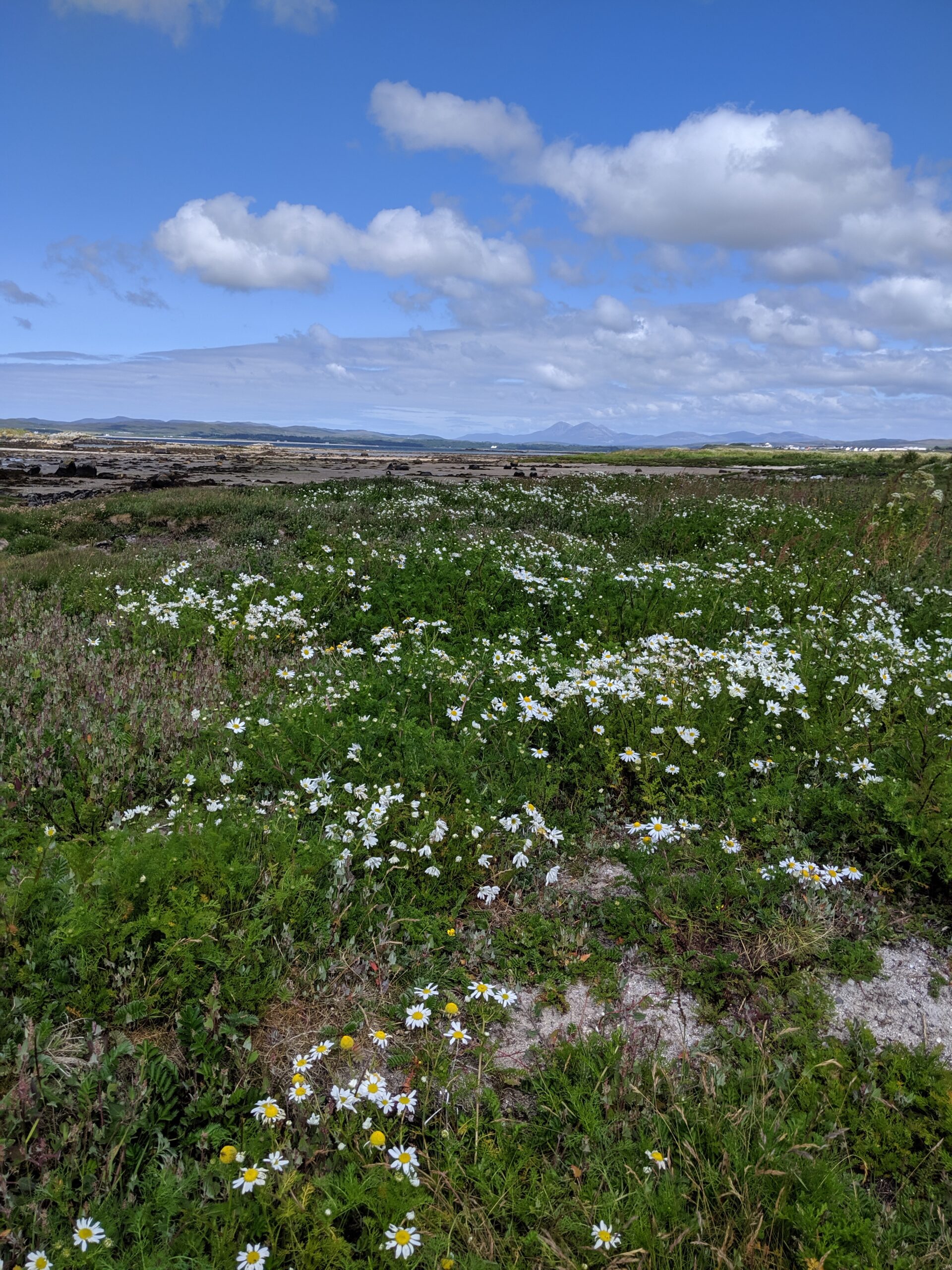
From the shipwreck site on Loch Indaal Bay, the white buildings of the village of Bowmore are visible to the right in the distance. The tall mountains on the horizon are on the Isle of Jura, which lies north of Islay.
Islanders provided carts to help move salvaged baggage from the wreck to a secure location. A local merchant, Hector Simpson, stored the passengers’ salvaged luggage in his Bowmore warehouse. He had been appointed by Laird Walter Campbell, the current owner of the island and a member of Parliament, to supervise the recovery efforts. Alexander went daily back and forth to the wreck site to collect the family’s belongings, with special attention to his and his father’s books.
On Sunday, October 16, Alexander visited an early morning Sunday school for children in Bowmore run by George Fulton, a school teacher who was also an independent evangelical. Then he attended Presbyterian services at Kilarrow Parish Church, where Rev. McIntosh preached in English in the morning and in Gaelic in the afternoon.
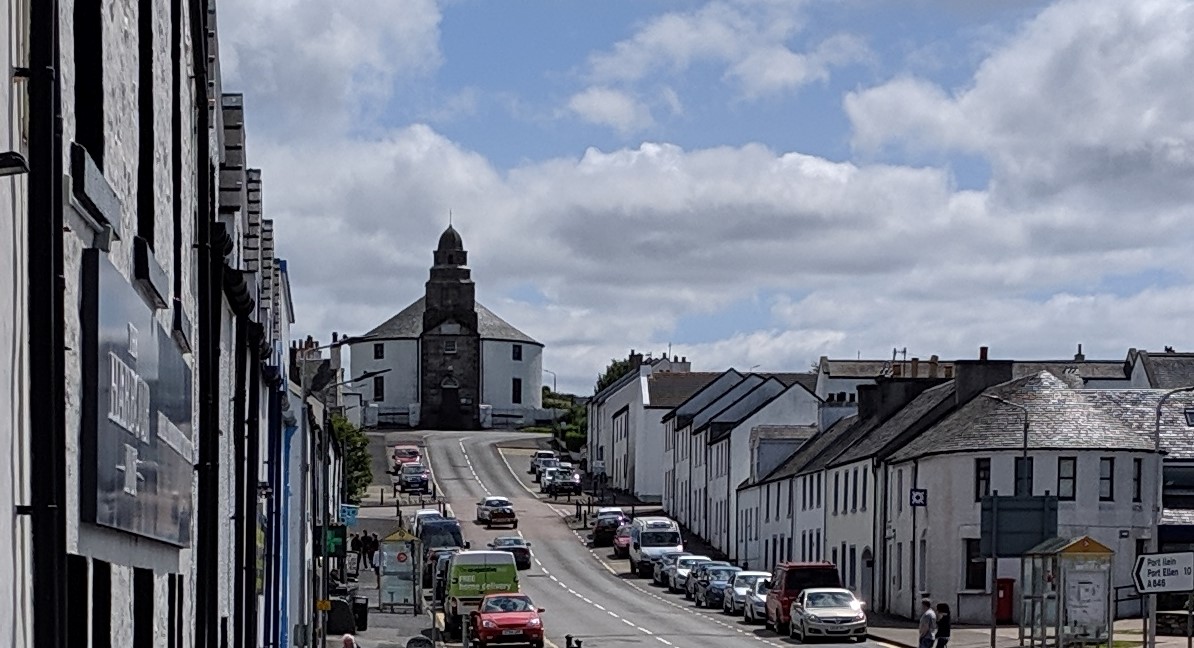
Kilarrow Parish Church (1767) in the village of Bowmore, Islay, UK. Its unusual round shape is accented by white walls and a stone tower facing the harbor. Laird Walter Campbell was buried there in 1816.
In his salvage efforts, Alexander paid special attention to drying his and his father’s books. Laird Campbell noticed his books and learned his name. He invited Alexander to visit his estate, Islay House, where, Richardson says, Alexander “spent many pleasant hours.”
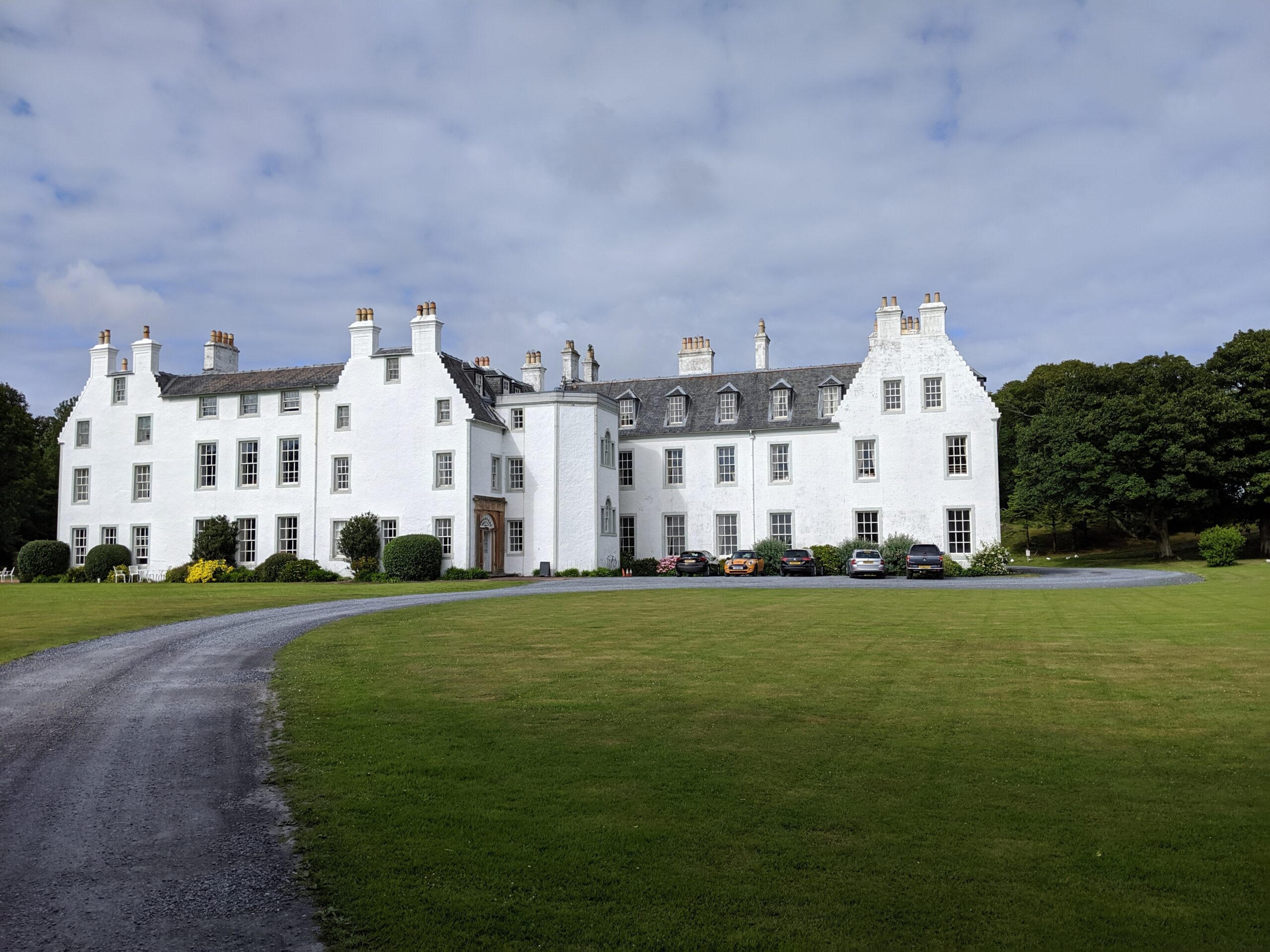
Islay House, home of the Campbell Lairds on Islay. It was begun in 1677. In 1808 it was owned by Laird Walter Campbell, who befriended Alexander, and who is buried at the Kilarrow Parish Church in Bowmore. See also the entrance and one of the grand staircases.
The estate lies at the top of Loch Indall Bay and faces south with views of the bay over a spacious lawn and park.
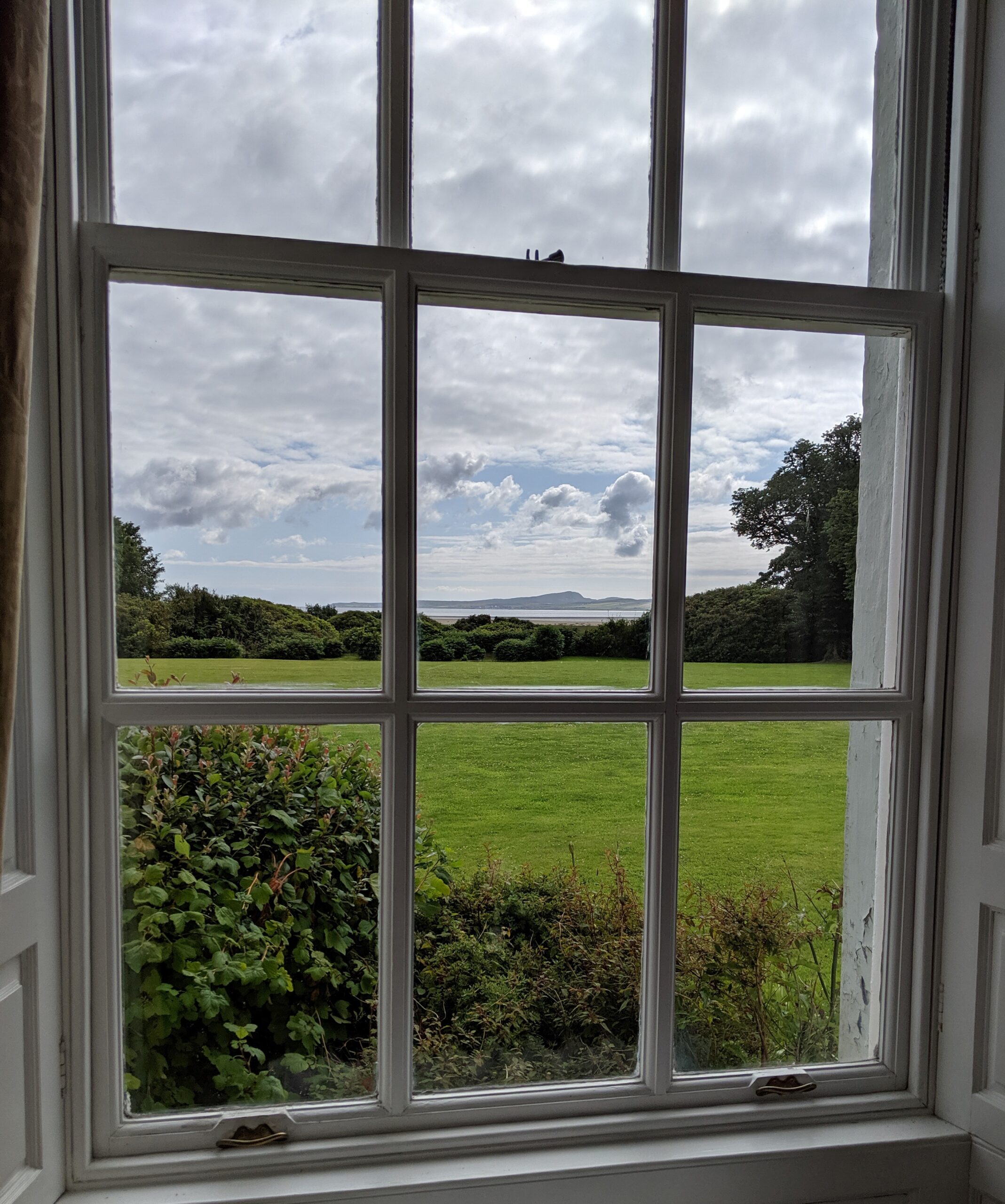
Loch Indall Bay and the Rinns of Islay viewed from Islay House, the former home of Laird Walter Campbell, who befriended Alexander Campbell. Looking south.
During their three weeks on Islay, the family discussed what to do next. They were reluctant to sail again, especially since the winter storms were soon to come. Alexander wanted to attend Glasgow University where his father had been educated, so they decided to relocate to Glasgow until the next summer.
After a second visit to the Kilarrow Parish Church on October 23, the family was ready to leave for Glasgow. On October 24, Alexander shipped the family baggage on a freight ship from Bowmore to Greenock, a port near Glasgow. Then the family left Bowmore and traveled by wagon ten miles to Port Askaig on the northeast shore of Islay. Alexander followed on foot.
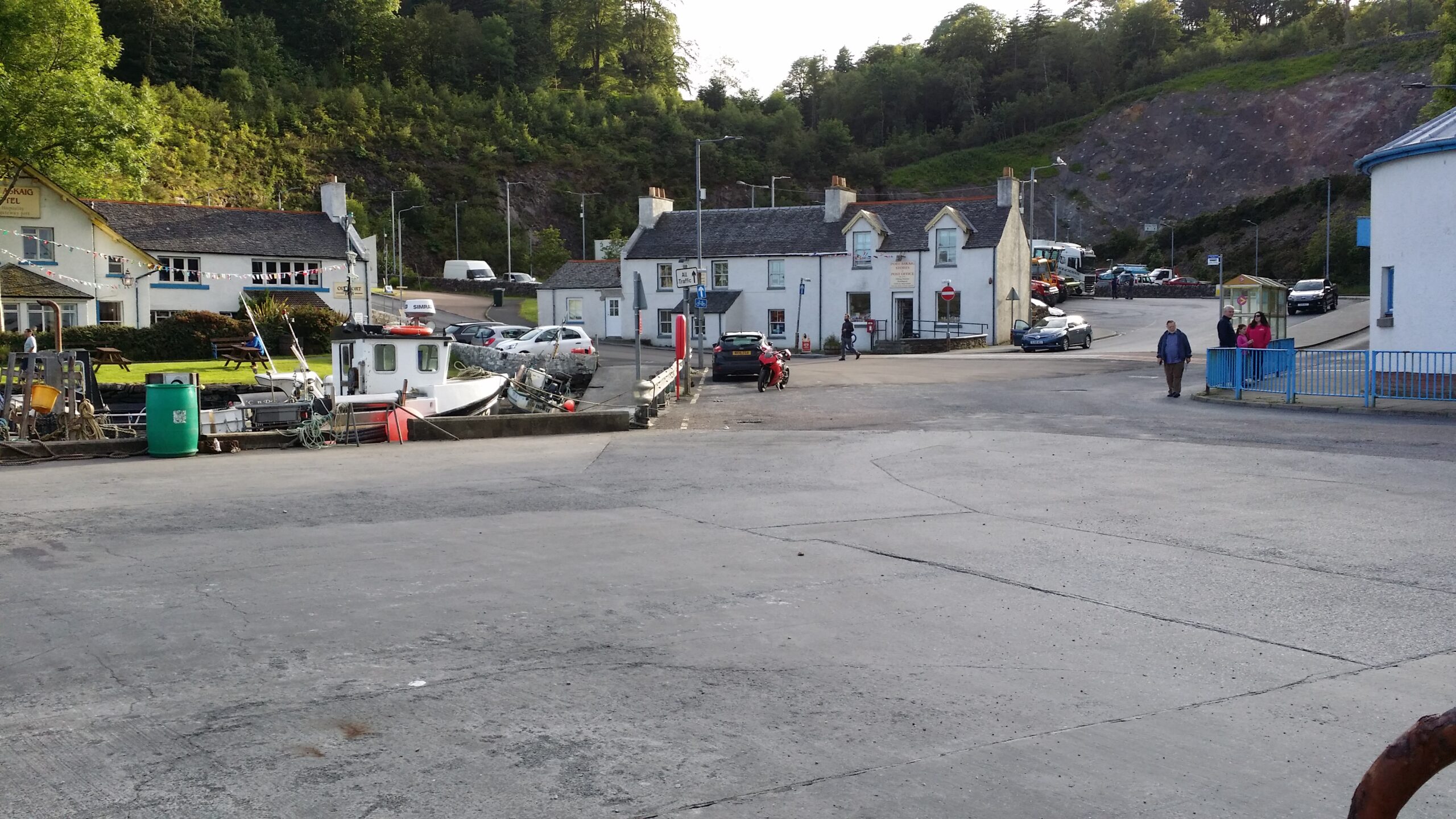
Port Askaig, from which Campbell family sailed for Glasgow. The little village on the north coast of Islay dates from 1767. It is now one of three ferry ports on the island.
From Port Askaig, their plan was to take a fairly direct route on a “packet boat,” a lighter boat used for mail and passengers, to Tarbert, on the Scottish mainland peninsula of Kintyre, and from there to get another packet to Greenock.
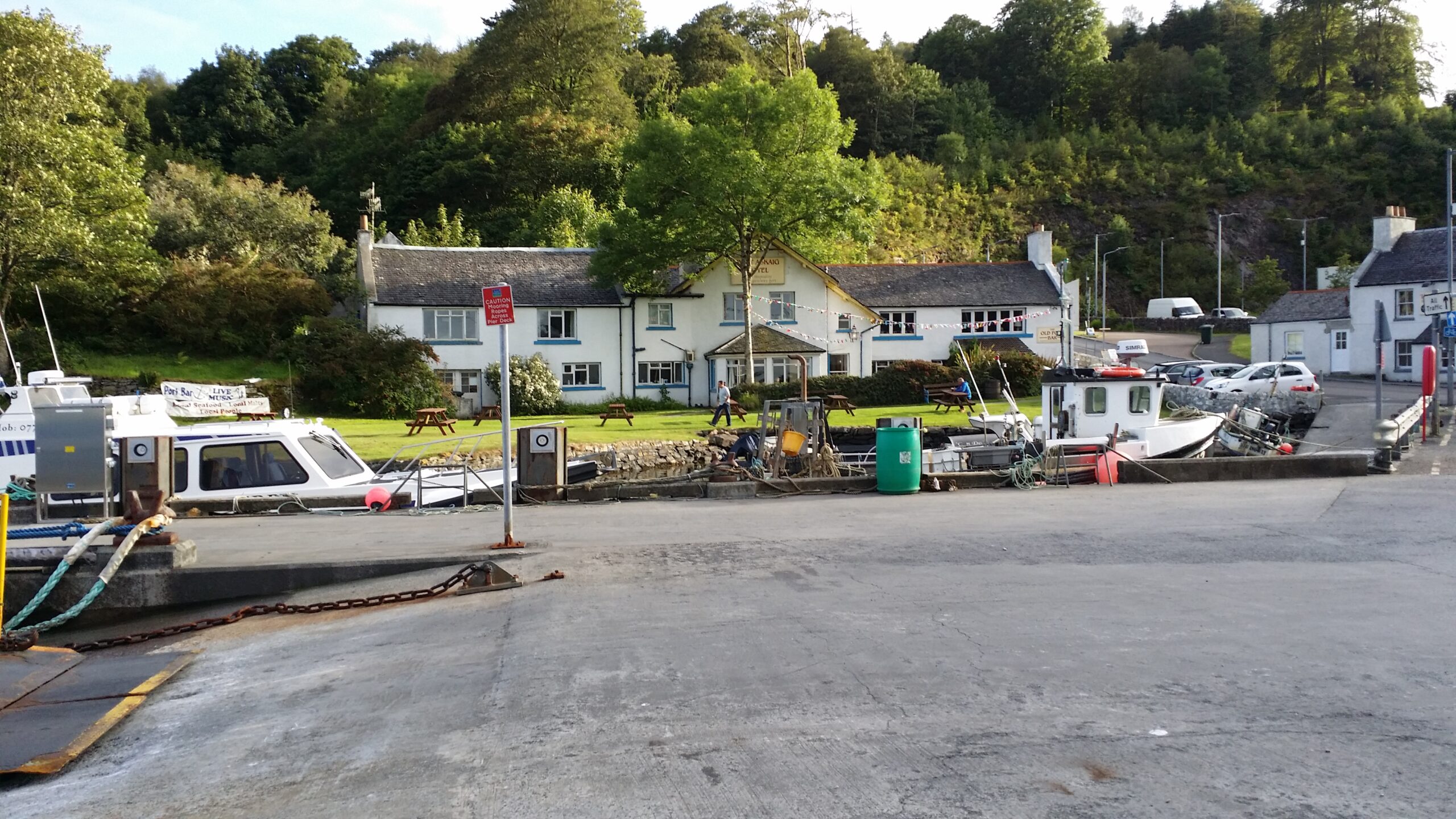
This hotel at Port Askaig is where the Campbell family stayed while waiting for the packet boat to Tarbert on Kintyre.
While they waited for the packet boat, Alexander made a day trip on October 26 across the half-mile sound that separates Islay from its mountainous neighbor, Jura. He spent the day hiking and reflecting.
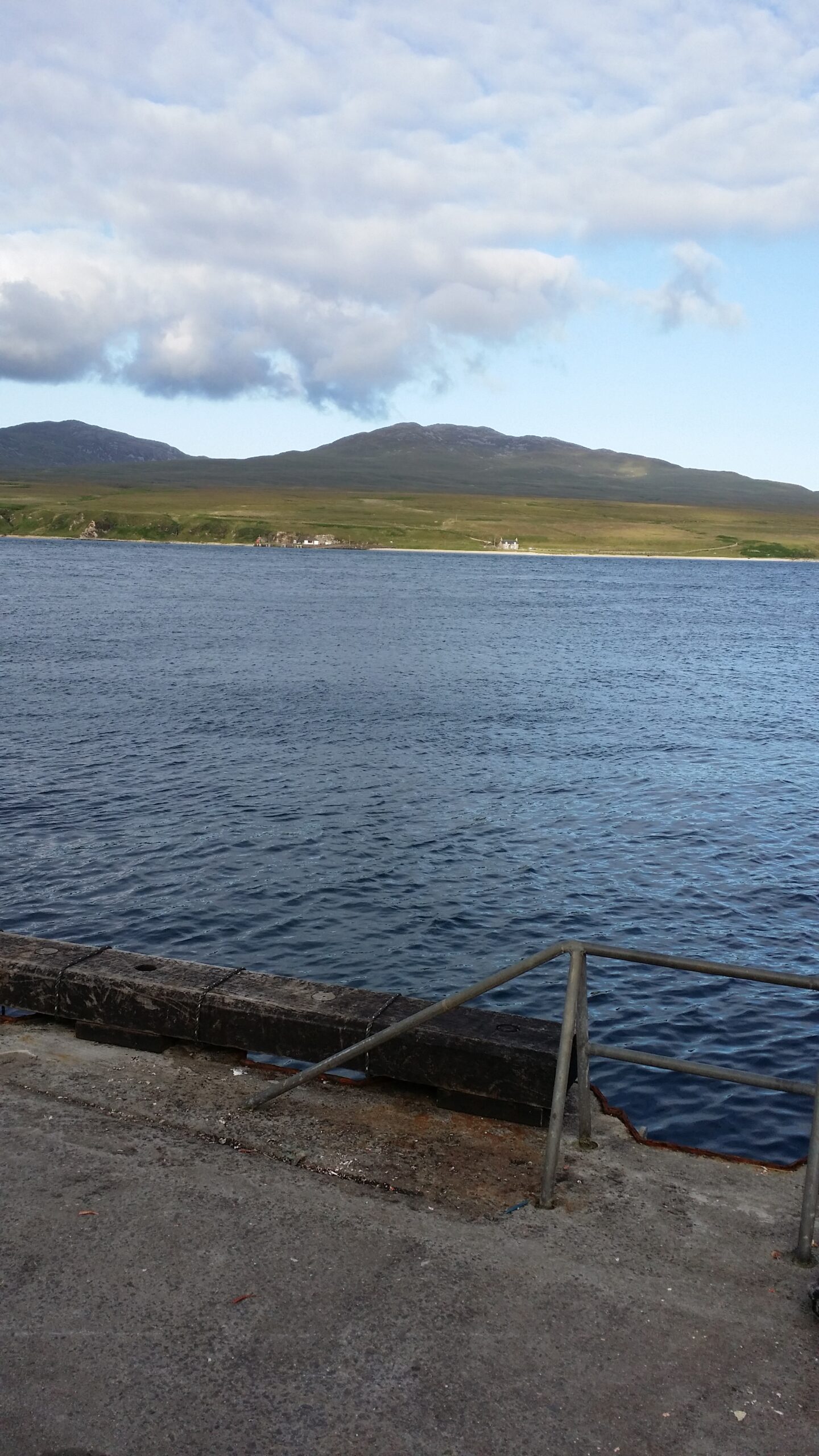
Mountains of Jura seen from Port Askaig, looking northeast from Islay. The sound between the two islands is only about half a mile wide.
On the morning of October 27th, the awaited packet arrived and the family embarked for Tarbert, where they planned to catch the boat to Greenock. Because of adverse winds, it took the packet ship 24 hours to travel about 23 miles to ArdPatrick, where the ship could make no further progress up the West Loch Tarbert. The Laird Campbell’s family at one of their estates, Ardpatrick house, supplied a large rowboat for the 24 passengers and their baggage.
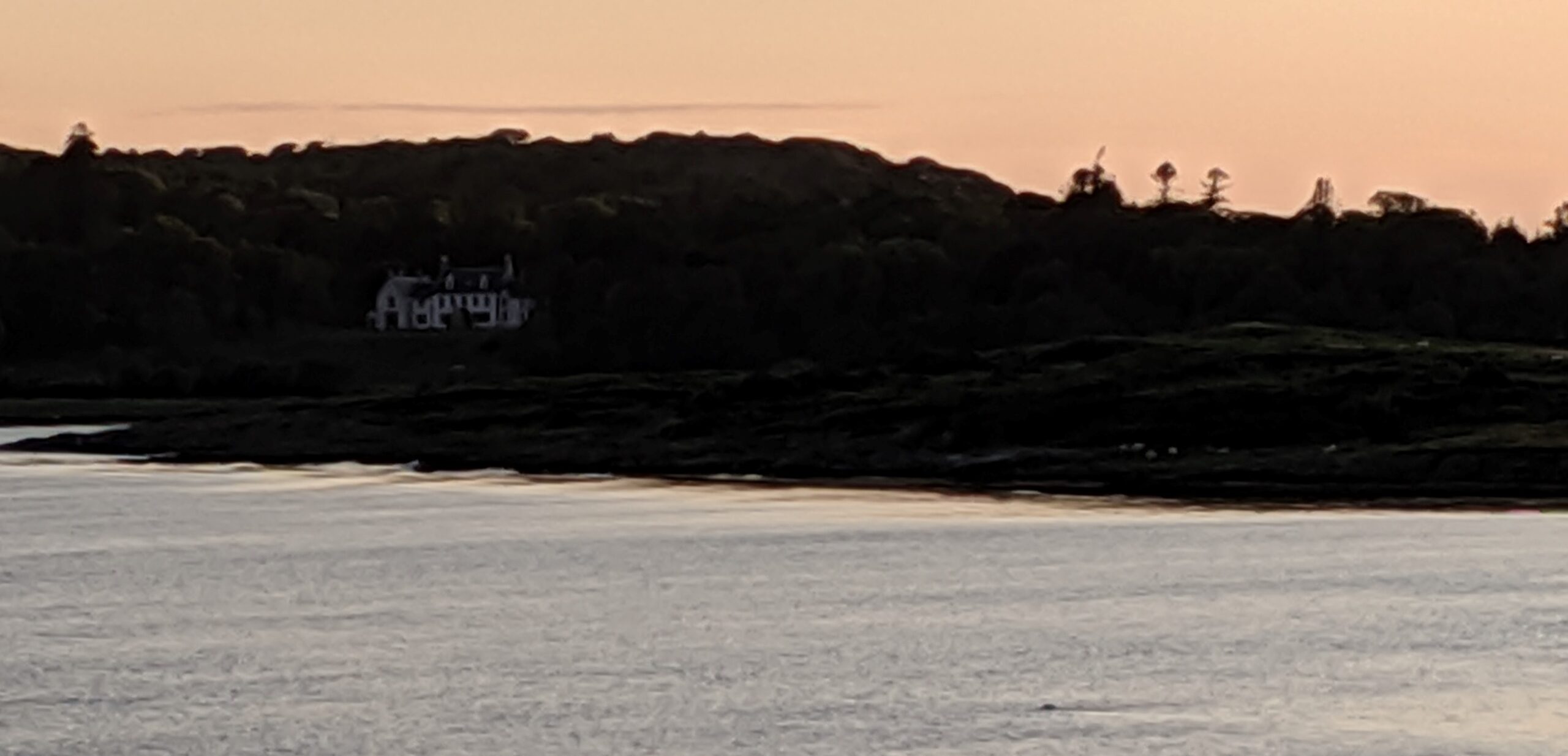
Barely visible at sunset, the large white Laird Campbell Ardpatrick House faces West Loch Tarbert, UK
Alexander rowed with others for another ten miles northwest to the end of West Loch Tarbert, arriving on Saturday afternoon, October 29th.

West Loch Tarbert, looking southwest. Alexander rowed the whole distance seen here and several miles further northeast.
The passengers then made a two-mile trip over land to the port of Tarbert in wagons. In helping other passengers out of the boat, Alexander fell into the water and was soaked. Nevertheless, he let others go ahead. For several hours he waited alone and chilled with his baggage for a wagon to return and take him to join his family in Tarbert.
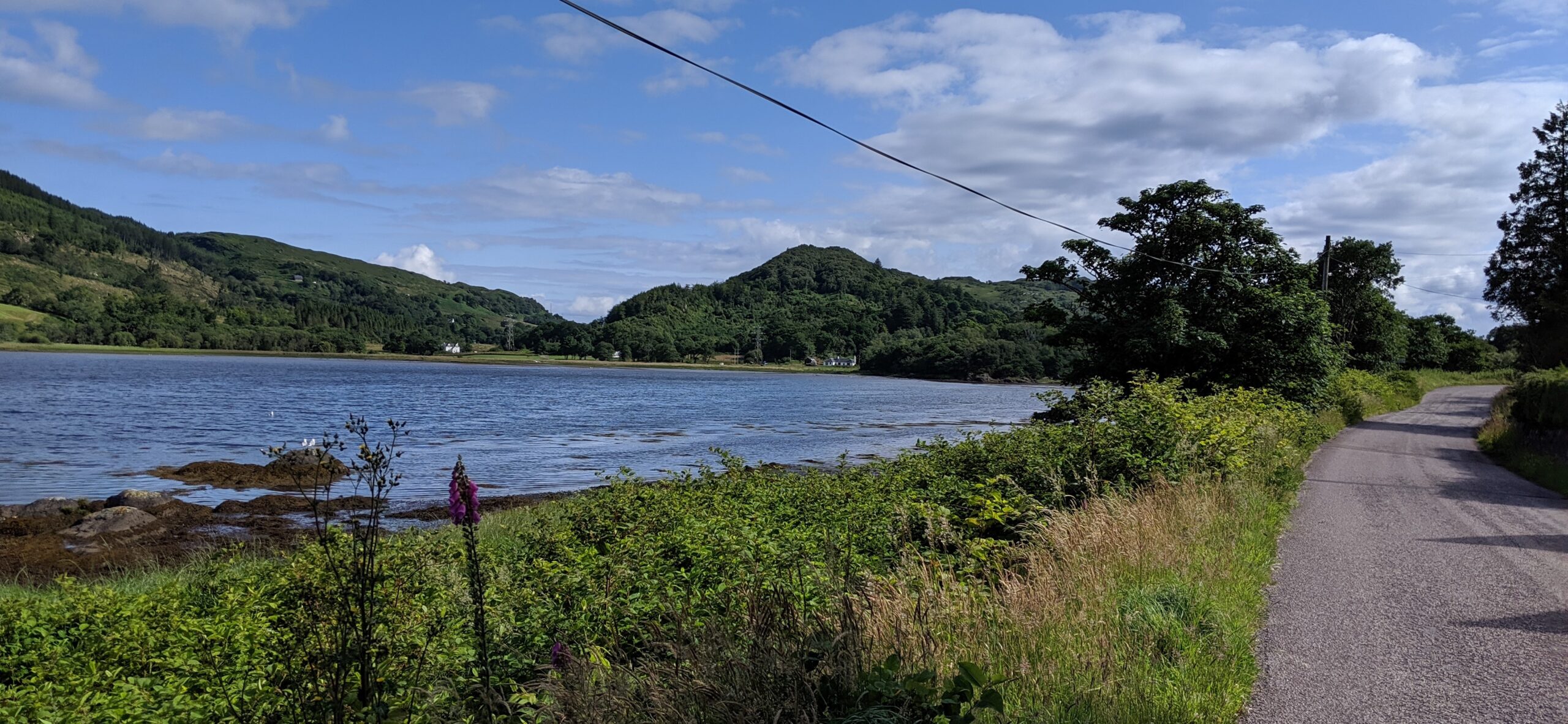
The northeast end of West Loch Tarbert. Here the Campbell family unloaded to travel two miles by wagon across the isthmus to the port of Tarbert on East Loch Tarbert.
The following day, Sunday, October 30th, Alexander spent the day in Tarbert in family worship and reading. The next morning they boarded a packet boat from Tarbert Harbor for a 45-mile trip to Greenock.
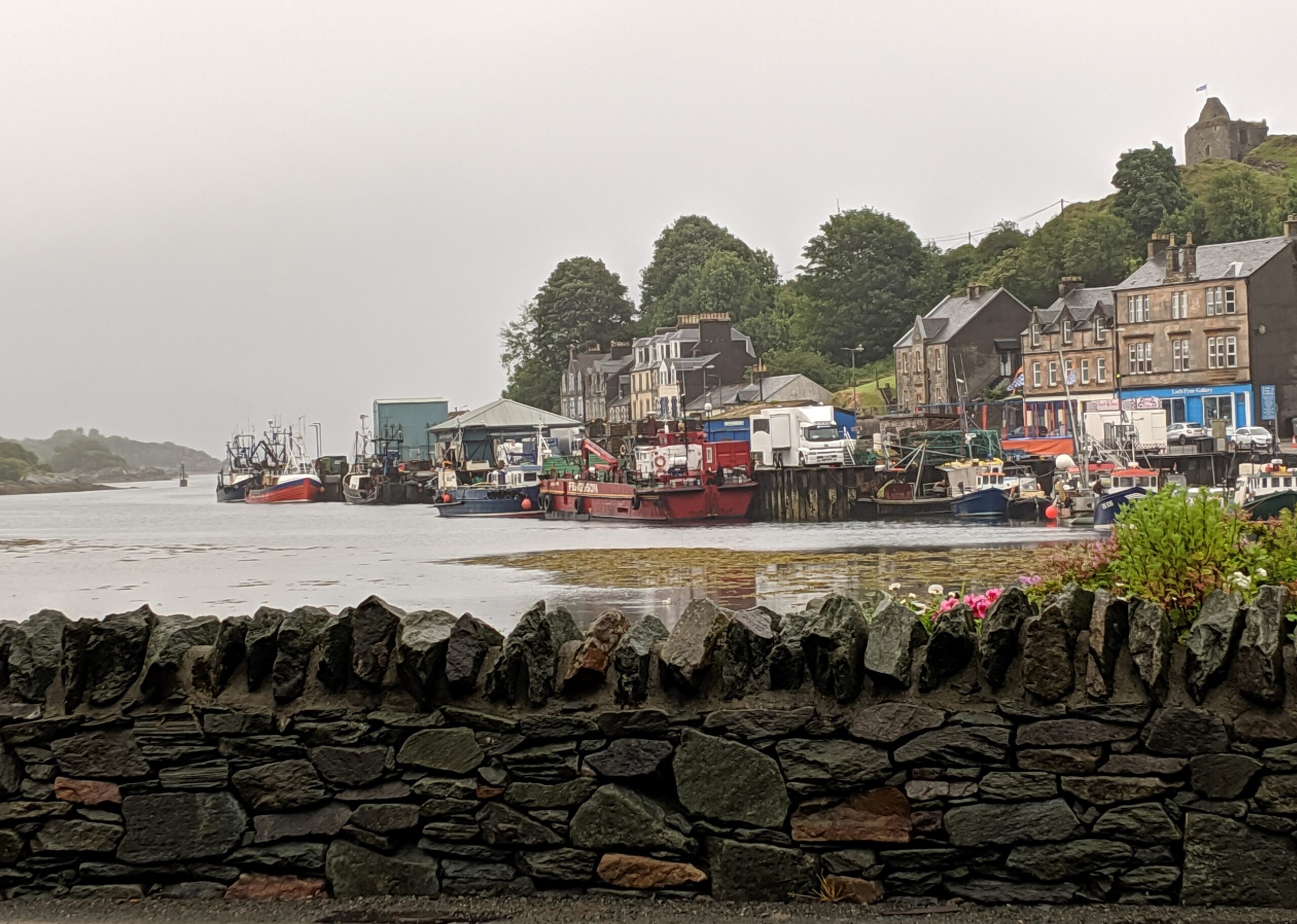
Tarbert Harbor on East Loch Tarbert, Kintyre, with Tarbert Castle above the town.
They sailed for eighteen hours until the wind failed them. On the next day, November 1, Alexander went ashore with the other male passengers in a small boat. He walked five miles into Greenock, arranged a place for the family to stay, and returned to get them and their baggage back to their lodgings in Greenock that night.
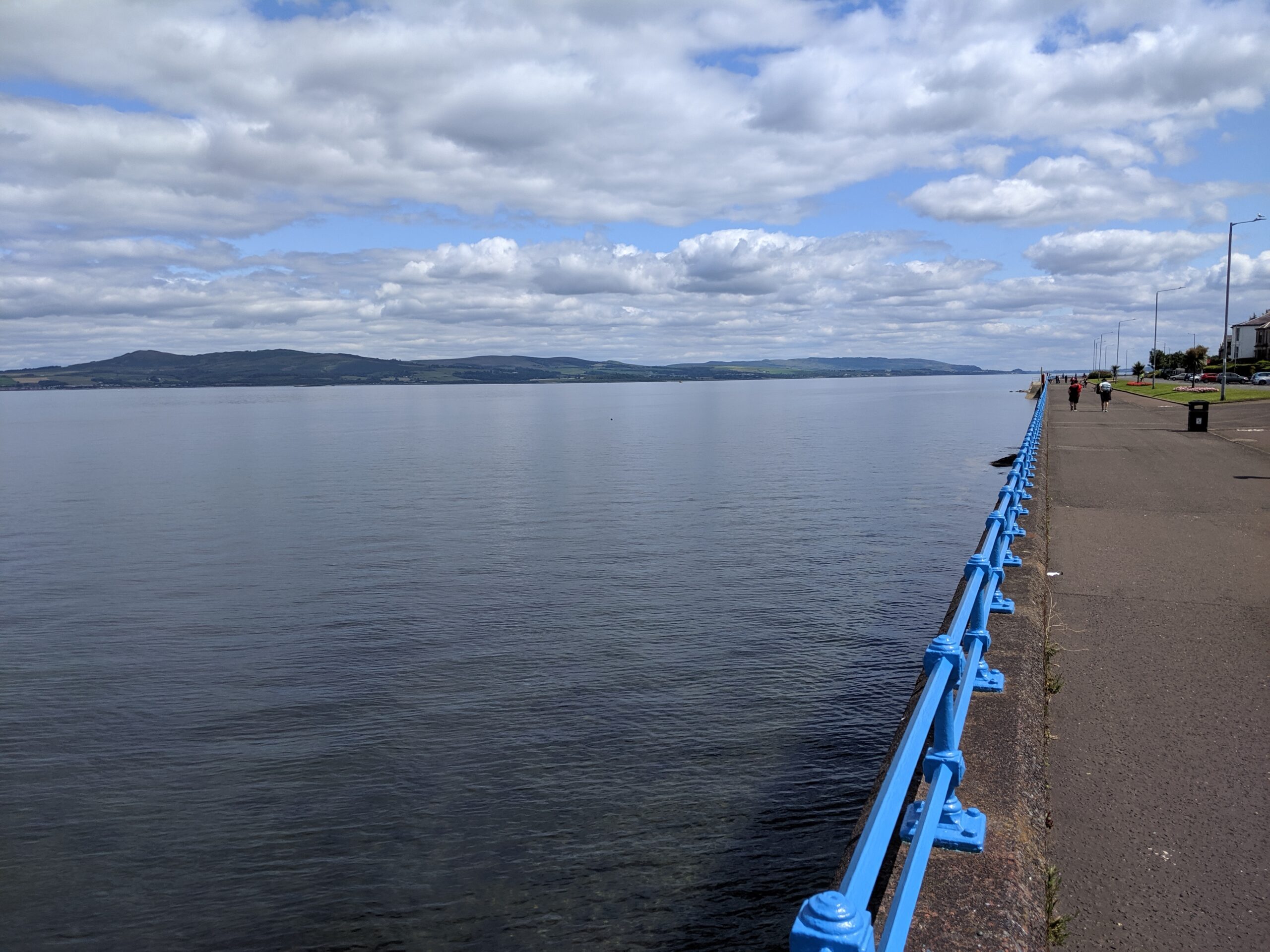
The Scottish port of Greenock, looking southeast up the Firth of Clyde toward Glasgow, which is about 25 miles away.
On November 2 Alexander made arrangements for his family and all their baggage to take a fly-boat, a small sailing ship, from Greenock to Glasgow on November 4. Then on November 3, he left early and walked twenty-three miles that day to Glasgow, carrying with him letters of introduction from Hector Simpson, the Islay merchant, to William Harley, a manufacturer; from Rev. Mr. McIntosh of the Scots parish church in Bowmore to Rev. Mr. McKenzie of Glasgow; and from the Islay Sunday-school teacher George Fulton to the famous Independent evangelist Greville Ewing. Alexander got a bite to eat, found #4 Carlton Place, and knocked on Greville Ewing’s door.
NEXT: Part 3: Glasgow
Open-Access photographs selected from my trip retracing Alexander’s journey to Glasgow are available for free download at ACU’s Stone-Campbell Teaching Archive for use in teaching. Read more about the Campbell family and Alexander’s life in Memoirs of Alexander Campbell by Robert Richardson (Philadelphia: Lippincott, 1868).
